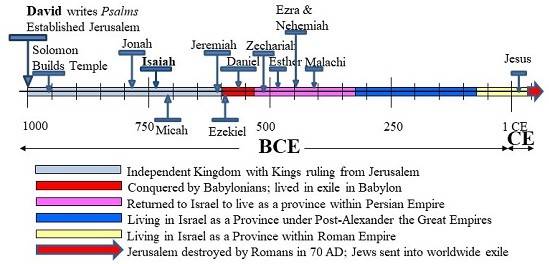We saw how the Bible portrays ourselves and others – that the Creator God originally made us in His Image. But the Hebrew Scriptures record how we then disobeyed the Creator God, giving rise to Kleshas in all of us. The Psalms are a collection of sacred songs and hymns used by the ancient Hebrews in their worship. Psalm 14, composed by King David about 1000 BCE, records how things look now from God’s perspective. Below is a timeline depicting when, relative to other prominent biblical characters, King David did so; alongside the passage itself:

2 The Lord looks down from heaven on all mankind
Psalm 14:2-3
to see if there are any who understand,
any who seek God.
3 All have turned away, all have become corrupt;
there is no one who does good,
not even one.
The phrase ‘become corrupt’ describes the entire human race. Since it is something we have ‘become’, the corruption is in reference to that initial ‘image of God’. This says that our corruption shows itself in a determined independence (our divorce) from God (‘all’ have ‘turned aside’ from ‘seeking God’) and also in not doing ‘good’.
Thinking Elves and Orcs

To better understand, think of the orcs of Middle-Earth in The Lord of the Rings and The Hobbit. Orcs are hideous creatures in appearance, conduct, and in their treatment of the earth. Yet orcs descended from elves that had become corrupted by Sauron. Reflect on the stately majesty, harmony, and relationship with nature that elves had (think of Legalos). Then realize that the depraved orcs were once elves who had ‘become corrupt’, and you catch what is said here about us. God created elves but they have become orcs.

Now in Middle-Earth, the elves do not live with the orcs – even though they are related. The evilness, corruption, and hatred of the orcs would make living with them impossible. There would be constant quarreling, fighting, and murders going on – completely disrupting the tranquil existence that elves crave. Thus elves separated themselves from orcs, living in beautiful places like Rivendell and Lothlorien, whereas the orcs tended to live in dark caves in gloomy mountains. The Bible describes something similar. After we corrupted ourselves, God separated from us, and so we now live in a realm of impermanence and death.
The Good, The Bad and the Ugly
So here we arrive at a perspective that is very instructive. The Bible starts with people as sentient, personal, creative and moral, but then also corrupt, fitting with what we observe about ourselves. The Bible is shrewdly spot-on in its assessment of people. It recognizes an intrinsic moral nature within us. Yet we can easily overlook this moral nature because our actions never actually match what this nature demands of us. Instead, the wisest insights of people discuss The Three Poisons, Kleshas (wrong thoughts) and Tanha (attachments). Then we see that we live in Duhkha (suffering) and annica (impermanence). Our enslavement to Kleshas is so strong that it causes us to miss the Eightfold Noble Path intended for us. How so? We look at this next.